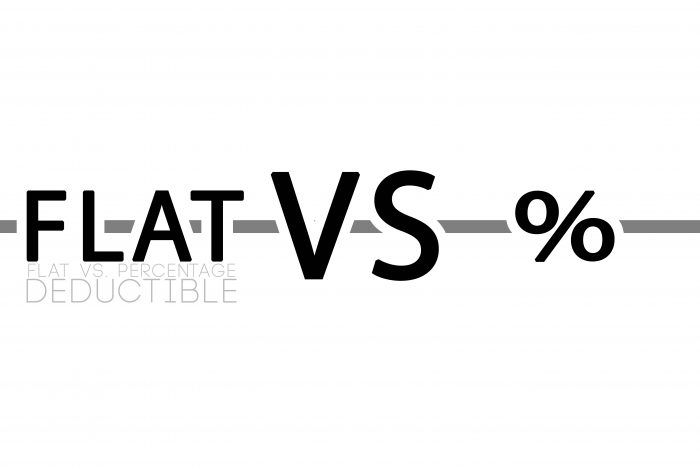Flat vs. Percentage Deductible

Flat vs. Percentage Deductible
When buying home insurance, there are confusing terms that you have not heard before. Then, your agent says something like “percentage deductible” and you cringe at the thought of mixing math with insurance.
We’re here to help make the insurance buying process easier. One way we do that is by explaining insurance in simple, easy-to-understand terms.
Home insurance requires that you choose a deductible limit. What is a deductible? In summary, it’s the amount of money you must pay on a claim before the insurance company will pay the rest. However, often, the money does not come out of pocket, but comes out of the total amount the insurance company will pay out. As the insured, you are responsible for the deductible.
Now that you have a basic understanding of what a deductible is, let’s talk about the different types. There are options when it comes to deductibles. Two of the most common types for a home insurance policy are: flat deductible, and percentage deductible.
What is a flat deductible? “Flat deductibles” are the most common form. The amount which you will pay is determined when you purchase your policy. You will have options to pick from, a higher deductible and a lower deductible. There are pros and cons to both. (Why would anyone want a high deductible?
Flat deductibles work like this: Say your deductible is $5,000 and the claim is a $20,000 roof replacement. Your deductible comes out of the total payment and you receive a check for $15,000.
What is a percentage deductible? The deductible is a percentage of the total limit of the dwelling coverage A you have on your home. For example, if your home is insured for $200,000 and the deductible is 1% of that coverage, you are agreeing to pay a $2,000 deductible.
Having a high deductible or a percentage deductible can save you money on your insurance policy. These deductibles may work for you if you live in a low-risk neighborhood–how is the weather? Is there a high crime rate? Are you financially able to take on a higher deductible if an occurrence destroyed your home? Talk more with your independent insurance agent to pick the right type of deductible for your needs.
Deductible types vary upon coverages. Often, there are different types of deductibles for earthquake, hurricane, wind or hail, and flood insurance, all depending upon your insurance company and the state you live in. Due to the increase in hail claims, percentage deductibles are becoming much more common. Check with your independent insurance agent to learn about the types of deductibles you may have.
Do you have questions about your insurance? Find an insurance agent near you with our Agent Finder
Search All Blogs
Search All Blogs
Read More Blogs
The Mystery of the Plastic Baby: A Guide to Mardi Gras and the King Cake
Why is there a baby in the cake? Discover the history and traditions of Mardi Gras 2026 and the delicious mystery of the King Cake.
Let the Good Times Roll—Safely: Mardi Gras Liability for Your Business
Hosting a Mardi Gras party this Tuesday? Make sure your business has the right event liability and liquor coverage before the beads start flying.
The Business “Prenup”: Why Business Partners Need Life Insurance in February
Love your business partner? Protect your company with a Life Insurance-funded Buy-Sell agreement to ensure the business survives the unexpected.
Heading South? Insuring Your Mid-Winter Break Road Trip in February
Driving to find some sun this week? Check your roadside assistance and rental car coverage before you leave the driveway.
Spring Dreams, Winter Schemes: Updating Your Insurance Before Your Spring Renovation
Planning a Spring kitchen remodel? Learn why you need to call your insurance agent before the contractors arrive to ensure your project is covered.
Shadow or Spring? The Quirky Science and Folklore of Groundhog Day 2026
Will he see his shadow? Dive into the history and humor of Groundhog Day 2026 and why we still trust a rodent with our weather forecasts.
Stocked for Love: Protecting High-Value Valentine’s Inventory with Business Insurance
Is your Valentine’s stock protected? Ensure your business insurance accounts for the massive inventory surge happening in early February.
New Life, New Responsibility: Why a February Arrival Means Updating Your Policy
Welcoming a new family member this February? It’s time to move life insurance to the top of your to-do list to ensure your child’s future is secure.
Delivering Love: The Insurance Risks of Valentine’s Week Gig Work
Delivering flowers or chocolates for extra cash this Valentine’s? Make sure your car is actually insured for delivery work before you hit the road.
Tax Prep & Protection: Ensuring Your Home Office is Fully Insured for 2026
Prepping your taxes? Don’t forget to check your home office insurance. Your standard policy might not cover your professional gear or liability.










